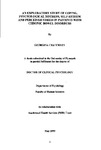AN EXPLORATORY STUDY OF COPING, PSYCHOLOGICAL DISTRESS, SELF-ESTEEM AND PERCEIVED STRESS IN PATIENTS WITH CHRONIC BOWEL DISORDERS
| dc.contributor.author | CRATCHLEY, GEORGINA | |
| dc.contributor.other | School of Psychology | en_US |
| dc.date.accessioned | 2013-10-25T09:21:28Z | |
| dc.date.available | 2013-10-25T09:21:28Z | |
| dc.date.issued | 1999 | |
| dc.identifier | NOT AVAILABLE | en_US |
| dc.identifier.uri | http://hdl.handle.net/10026.1/2367 | |
| dc.description.abstract |
This study had 4 aims. The first aim was to explore the relationships between personal control and coping responses in patients with the chronic bowel disorders of irritable bowel syndrome (IBS) and inflammatory bowel disease (IBD). The second aim examined coping in IBS and IBD patients as a process, by focusing on a specific episode of their primary symptoms. The coping profiles of the IBS and IBD patients were compared to establish whether differences in coping between the 2 groups were present. The third aim examined differences between groups and tested for linear trends across IBS, IBD patients and Non-patient controls in relation to anxiety, depression and self-esteem. A supplementary aim was to evaluate whether anxiety in the 3 groups was considered to be clinically significant (i.e. fell above the threshold for "caseness"). The fourth aim tested differences between the 3 groups in perceived stress, as previous findings have been inconclusive. Fifteen IBS patients and 15 IBD patients who attended a Gastroenterology (G.I.) Clinic were interviewed and completed a battery of self-report measures. Fifteen Non-patient controls completed a battery of self-report measures. The data was analysed using Pearson's product moment correlation coefficients for aim 1; profile analysis using MANOVA for aim 2, and one-way between subjects ANOVA's for aims 3 and 4. The research hypotheses were not met, as the results were not statistically significant. However, two post-hoc findings revealed that patients with bowel disorders used equal proportions of problem and emotion-focused coping and these types of coping were significantly positively correlated. The test of flatness within profile analysis was statistically significant which indicated that patients with bowel disorders do not use a "blanket" approach to coping with an episode of their primary symptoms. A percentage of people in each group met the criterion for "caseness" of clinically significant anxiety. The results were evaluated in relation to the research literature and directions for future research were outlined. It was suggested that there might be a subset of patients with bowel disorders who experience clinical anxiety and/or depression and screening in G.I. clinics was recommended. | en_US |
| dc.description.sponsorship | Southmead Health Services (NHS) Trust | en_US |
| dc.language.iso | en | en_US |
| dc.publisher | University of Plymouth | en_US |
| dc.title | AN EXPLORATORY STUDY OF COPING, PSYCHOLOGICAL DISTRESS, SELF-ESTEEM AND PERCEIVED STRESS IN PATIENTS WITH CHRONIC BOWEL DISORDERS | en_US |
| dc.type | Thesis | |
| dc.identifier.doi | http://dx.doi.org/10.24382/3390 | |
| dc.identifier.doi | http://dx.doi.org/10.24382/3390 |
Files in this item
This item appears in the following Collection(s)
-
01 Research Theses Main Collection
Research Theses Main


